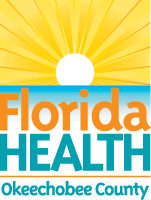It's a New Day in Public Health.
The Florida Department of Health works to protect, promote, and improve the health of all people in Florida through integrated state, county, and community efforts.
Precautionary Measures to Prevent Mosquito-Borne Illnesses
August 31, 2015
Okeechobee, Fla. – Due to recent rainfall, officials at the Florida Department of Health (DOH) in Okeechobee County emphasize the importance of Florida’s residents and visitors protecting themselves against mosquito-borne diseases.
DOH recommends the public to remain diligent in their protecting themselves from mosquito bites by following the “5 D’s,” which include:
- Dusk and Dawn – Avoid being outdoors when mosquitoes are seeking blood. For many species, this is during the dusk and dawn hours.
- Dress – Wear clothing that covers most of your skin.
- DEET – When the potential exists for exposure to mosquitoes, repellents containing DEET (N,N-diethyl-meta-toluamide, or N,N-diethyl-3-methylbenzamide) are recommended. Picaridin, oil of lemon eucalyptus, and IR3535 are other repellent options. If additional protection is necessary, a permethrin repellent can be applied directly to your clothing. Again, always follow the manufacturer’s directions.
- Drainage – Check around your home to rid the area of standing water, which is where mosquitoes can lay their eggs.
Tips on Repellent Use
- Always read label directions carefully for the approved usage before applying a repellent to skin. Some repellents are not suitable for children.
- Products with concentrations of up to 30 percent DEET are generally recommended. Other potential mosquito repellents contain picaridin, oil of lemon eucalyptus, or IR3535. These products are generally available at local pharmacies. Look for active ingredients to be listed on the product label.
- Apply insect repellent to exposed skin, or onto clothing, but not under clothing.
- In protecting children, read label instructions to be sure the repellent is age-appropriate. According to the CDC, mosquito repellents containing oil of lemon eucalyptus should not be used on children under the age of 3 years. DEET is not recommended on children younger than 2 months old.
- Infants should be kept indoors or mosquito netting should be used over carriers when mosquitoes are present.
- Avoid applying repellents to the hands of children. Adults should apply repellent first to their own hands and then transfer it to the child’s skin and clothing.
- If additional protection is necessary, apply a permethrin repellent directly to your clothing. Again, always follow the manufacturer’s directions.
Tips on Eliminating Mosquito Breeding Sites
Elimination of breeding sites is one of the keys to prevention.
- Clean out eaves, troughs and gutters.
- Remove old tires or drill holes in those used in playgrounds to drain.
- Turn over or remove empty plastic pots.
- Pick up all beverage containers and cups.
- Check tarps on boats or other equipment that may collect water.
- Pump out bilges on boats.
- Replace water in birdbaths and pet or other animal feeding dishes at least once a week.Change water in plant trays, including hanging plants, at least once a week.Remove vegetation or obstructions in drainage ditches that prevent the flow of water.
Symptoms of West Nile virus may include headache, fever, fatigue, dizziness, weakness and confusion. Physicians should contact their county health department if they suspect an individual may have a mosquito-borne illness. DOH laboratories provide testing services for physicians treating patients with clinical signs of mosquito-borne disease.
DOH continues to conduct statewide surveillance for mosquito borne illnesses, including West Nile virus infections, Eastern Equine Encephalitis, St. Louis Encephalitis, malaria and dengue. For more information on mosquito-borne illnesses, visit DOH’s Environmental Health Web site at https://www.floridahealth.gov/Environment/medicine/arboviral/index.html or calll your local county health department at 863-462-5819.





Connect with DOH